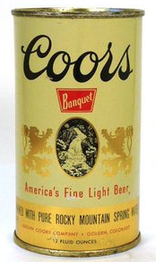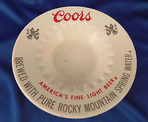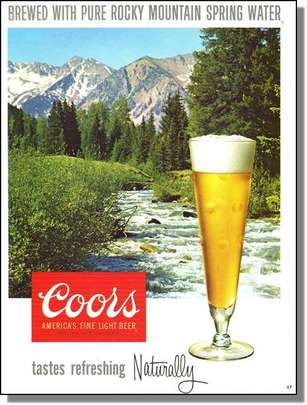But, you may ask, how long can a brand stick with such a strategy? Won't beer drinkers become bored with getting the same strategic message? "People already know all that!" is what one Coors marketing executive screamed 25 years ago after reviewing ads continuing to celebrate the brewery's location and water. He demanded more entertaining ads. A short time later, he was ushered out of the brewery.
The Coors experience
Marketing people came and went, but Coors remained the poster child for consistent brand positioning. No other beer brand can match its record. From before the brewery first began major-media advertising in the 1970s, and continuing to this day with but a few off-strategy excursions along the way, Coors beer has been sold on the basis of its distinctive product features.
In Coors' earliest days, Pure Rocky Mountain Spring Water--abbreviated "PRMSW" in the company's marketing offices --was the linchpin selling message. Bar signs and print ads married that headline to the beauty of the Golden, Colorado Rocky Mountain home of the brewery. Popular promotional ceramic ash trays (still selling on eBay) featured the PRMSW headline. And of course, the same line appeared prominently on the iconic label right beneath the rabbit-shaped waterfall.
Years later, when Coors began to expand outside its original 10-state distribution footprint, it also began to advertise on television, a decision reached only reluctantly by the tradition-minded Coors family. Entertainment-based ads, so popular among beer brands at the time, were rejected out of hand by the stoic brewery owners. Coors would go against convention and use its new medium to talk about how its beer was different.
Comparing Coors' consistent focus on product distinctiveness to so many other beer brands' (including some others in the Coors stable) stumbling from one direction to the next begs a question: Who's to blame?
Most responsible: Senior client leadership who should champion the power of product distinctiveness and lead the effort to identify the most potent aspects of each beer brand, instead often choose to simply demand "a breakthrough advertising idea." It abrogates their responsibility and shifts it to others. Worst of all (as Bud Light continues to demonstrate) it just doesn't sell beer.
Somewhat responsible: Too many young brand managers are looking to "leave their mark" on the brand during their relatively short tenures. They see staying with an idea someone else developed as less attractive than moving on to something new, something with their name on it. It's about putting what looks impressive on their resumés ahead of what's best for the brand.
Enabling: As we've often said, most ad guys favor advertising that's long on entertainment and bereft of product facts. Ad agency creative people want to put their mark on the brand, too. No matter what they say, way too many favor advertising that brings attention... on themselves and the ad agency.
What're the odds all these folks could make the wrong move at the same time?
Way higher than they should be.






 RSS Feed
RSS Feed
